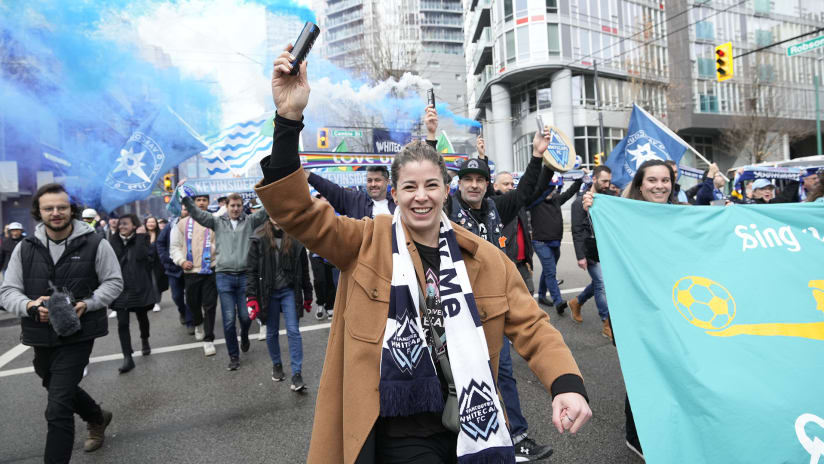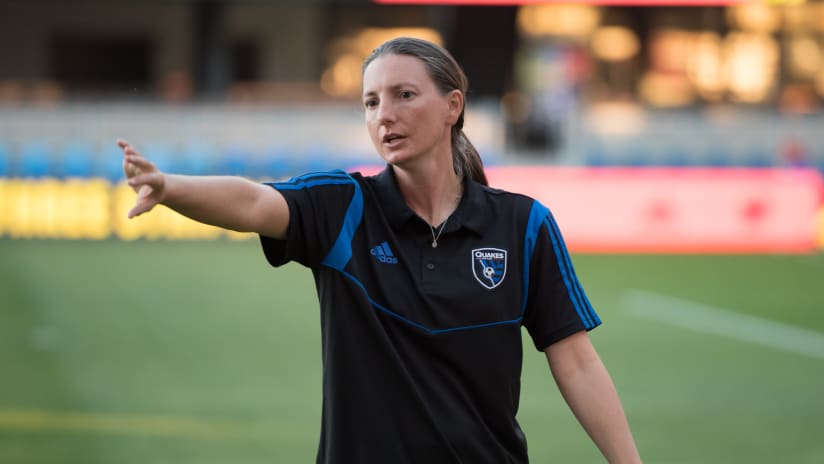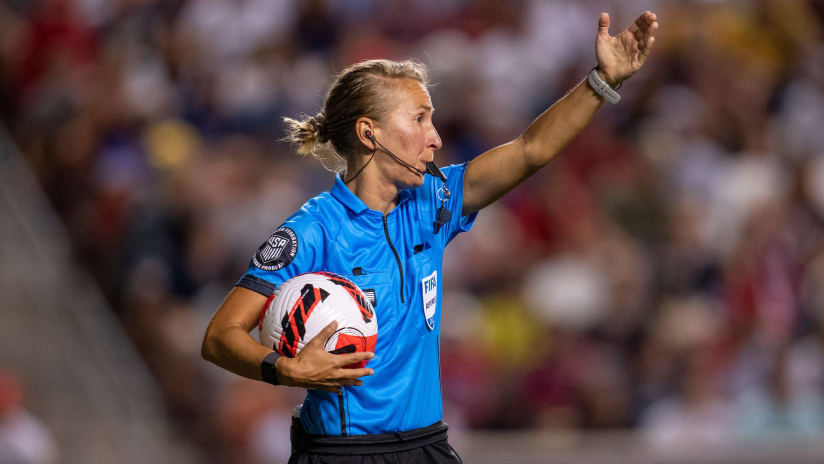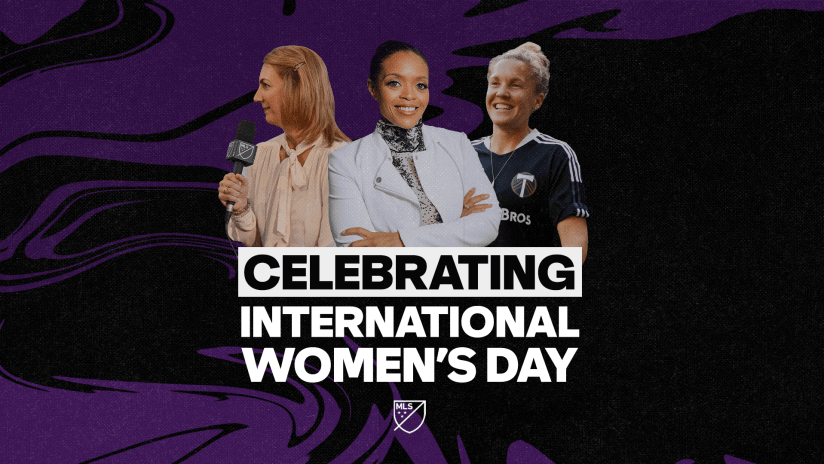Soccer was a cherished family and community legacy for Amanda Oliver as she grew up in Newcastle during the Thatcher era.
“I would go and see Newcastle United\] play,” recalled the multi-hyphenate Canadian, grassroots coach and devoted [Vancouver Whitecaps supporter to MLSsoccer.com earlier this month, “and be there in the stands of the Gallowgate End with my dad, just soaking up all the good feels about what soccer did for all of us.
“You grow up in the UK, it's almost like a religion because, you know, you work hard all week; my dad worked in the mines, right? So it's like on the weekend, you lived for soccer. That was it. It's so much a part of my heritage and identity.”
Yet one key facet of the footballing experience was off-limits to Oliver and her fellow girls back then. As was long the case in so many countries where the sport was and is otherwise universal, organized play was considered simply too unladylike.
“I played a lot of street soccer,” she said, “but wasn't allowed to play soccer for a school team, or to play in any kind of league.”
Those experiences guide Oliver’s 9-to-5 career as a social worker with the British Columbia Ministry of Children and Family Development, as well as her life in soccer. She’s a member of the South Sisters and Rain City Brigade supporters groups, turning out at BC Place and Swangard Stadium to cheer on not only the Whitecaps, but also local supporter-owned League1 BC side TSS Rovers and the national teams when they hit town.
And, someday not too far down the road, one of Canada’s first-ever fully professional women’s teams, too.
Project 8: Canada’s first women’s pro league
That’s the plan being carried out by Stephanie Labbé, the gold medal-winning Canadian women’s national team goalkeeper who retired last year and took up the position of general manager of women’s soccer for VWFC. The Caps have signed on as a founding member of Project 8, a new league announced in December and slated to launch in 2025 with eight teams across Canada – not just the first women’s pro soccer division in the nation’s history, but its first women’s pro sports league of any kind.
It’s a startup, a mission and a movement, an effort to build a legacy as Canadian soccer surges into a new era of competitiveness and relevance across the board, even amid the national teams’ ongoing struggles for improved governance and working conditions, and the ongoing need for women’s players to move abroad to reach the highest levels.
“There’re so many people that unfortunately we've lost, not only just athletes, but people off the field as well, for having opportunities in professional sports,” Labbé told MLSsoccer.com. “Some incredible female coaches, referees, business administrators, people that have had to leave the country to pursue their dreams in sports. And so now to be a part of this exciting time of bringing women's professional soccer to Canada, it's really awesome.”
That added an extra layer of meaning to the Caps’ Women & Girls in Sport match last weekend, a celebration of International Women's Day for their home game vs. FC Dallas.
In addition to clinics for local girls’ teams, promotions with local artists and women-owned businesses and other events, the South Sisters led the pregame march to the match and held a rally and Q&A session in support of women’s soccer, featuring Labbé, CanWNT head coach Bev Priestman and Emma Humphries, the former New Zealand international who now works as VWFC’s director of women's football development.
“There's just a real big buzz around the club at the moment,” said Humphries. “We've tried a couple times to get women's professional football off the ground in Vancouver, and to kind of finally commit to what that's going to look like now, it's just so exciting.
“We've been running the [National Development Centre] youth programs on behalf of Canada Soccer for many years now, and what that's done to the kids is just incredible. You can see the excitement with it. You can see that they see that pathway, and the options to them are so much more now.”
“Keep the money right here in Canada”
Labbé and her CanWNT teammates Diana Matheson and Christine Sinclair are key figures spearheading Project 8, which has also signed on Calgary Foothills SC as a co-founding club and enlisted corporate sponsors like Air Canada, CIBC and Canadian Tire. Additional participants are being recruited across the country, with the hope that all eight member clubs will be identified by year’s end.
“The conversations we’re having with other potential ownership groups are super exciting and there's a couple that are very close to joining in soon now,” said Labbé. “Clubs want to be a part of this. And I think the more conversations we have and the more we talk about it, the more that people are really seeing the benefit of this, and that this is so much greater than just soccer.
“This is a movement. This is going to be huge for business, this isn't just helping young female soccer players. This is helping coaches, referees, business administrators, commentators – the list goes on for how great this is going to affect the whole sporting world and economy.”
It’s an unprecedented push. While Canada Soccer were partners with U.S. Soccer and the Mexican federation on the launch of NWSL in 2013, Labbé believes Project 8’s focus to “keep that money right here in Canada, invest in our own youth” will grow the entire domestic ecosystem on a whole different scale.
Building a brighter future
It’s also a long-awaited return to women’s soccer for VWFC, which fielded teams in the old USL W-League from 2003-12, twice winning the lower division’s championship and nurturing stars like Sinclair, Andrea Neil, Erin McLeod, Melissa Tancredi, Sydney Leroux and Kaylyn Kyle. And it’s a tangible step towards redemption from the scandal that cast a deep shadow over the Whitecaps Women program: allegations of harassment and abuse brought by members of that team against former coach Bob Birarda in 2008 and former coach Hubert Busby, Jr. in 2011.
MLS commissioned an independent investigation into the Whitecaps’ handling of the matter, releasing its findings last year. While it concluded that the club’s response was “appropriate” and it had “since strengthened their policies and practices,” it also stated “the club could have initially done more to support the players,” mirroring the shortcomings found across women’s and youth soccer in recent years, most prominently with the misconduct brought to light at multiple NWSL clubs.
“One in four girls have been sexually abused [worldwide]. It's a reality that we face,” said Oliver. “You have to make [soccer] accessible for girls, but then you have to make it safe for us to play.”
The controversy rocked the Vancouver soccer community and beyond, straining relationships with and among supporters and other stakeholders. It’s also sparked a commitment to a new direction, towards a brighter, bolder future.
“They’re definitely making positive steps forward," said Harjeet Johal, a Vancouver-based journalist who covers the Whitecaps and Canadian soccer for Daily Hive, The Equalizer and other outlets. “But for some people, it was never going to be enough. They're going to want to see more action. So it's kind of a mixture … I think and I hope that Vancouver's really learned from their mistakes of the past.”
Labbé recognizes the context in which she’s arrived at VWFC, as well as the wider landscape of past and present battles for respect and recognition by players like her. And she is heartened by the buy-in she’s seeing.
“Number one, it's about using my voice to continue to fight for the things that we've been fighting for over the many years,” she said. “At the same time, I'm really lucky to be working for a club that has those values of equity and equality.
“When I'm asking for things and seeing things that our men's team has, and looking forward to two years from now, I'm looking at, where do we want our women to be, what type of things do we want our women’s [team] to have in terms of resources and opportunities, knowing that I have a club and an ownership group behind me that sees the equality side of all of that, and I'm not necessarily having to fight for things.”
A women’s soccer powerhouse
Greater Vancouver has long been a hotbed of the women’s game. Generations of distinguished CanWNTers grew up in the region, and the Whitecaps have built a vibrant youth system both locally and via their network of Academy Centres across BC and seven other provinces, with current standouts Jordyn Huitema, Jayde Riviere and Julia Grosso prominent products of the system.
Add in the sport’s popularity and unifying power across an incredibly diverse metropolis with high desirability for established players, and you have the makings of a WoSo powerhouse.
“It's got a long history, our academy, and we're just really excited to see some of those kids actually play locally for people to see,” said Humphries. “There'll be players coming back into the country that have been forced to play overseas. Only certain amounts can play in America because of the foreign player rules. You have your next generation of talented kids and you have people coming back to play in the country, and that kind of middle-age group that has sort of been lost to the game.
“So it's just going to have such a huge impact, I think, overall for women … it's just even bigger than football. It's like, you can be a professional in Canada now.”
As it is, Labbé and her CanWNT colleagues have won Olympic gold and bronze (twice) medals, and the program currently stands sixth in the FIFA World Rankings. With a fuller grassroots-to-pro pathway at home, who knows how high their ceiling could be?
“The women have achieved so much with so little. I mean, what could they achieve if we actually invested?” pondered Oliver. “That's the thing. The opportunity to have a women's league, we just have to build it and we will come. The supporters are here. We will support our team and I think the whole soccer culture is growing.
“What we have to do here is get people to see that women are included, that soccer here is more than just a man's game. That it's for everyone.”













